Arab, regional states reaffirm support for Syria sovereignty
Arab and regional foreign ministers back Syria’s sovereignty, condemn Israeli aggression, and call for international support to rebuild Syria and end foreign interference.
-

Security members carry belongings as they leave the damaged Syrian Defense Ministry building hit by several Israeli airstrikes, in Damascus, Syria, Wednesday, July 16, 2025. (AP)
Foreign ministers from 11 Arab and regional states, including Jordan, the UAE, Bahrain, Turkey, Saudi Arabia, Iraq, Oman, Qatar, Kuwait, Lebanon, and Egypt, held intensive discussions over the past two days regarding the latest developments in Syria.
In a joint statement, the ministers affirmed their unified position and shared efforts to support the Syrian government in rebuilding the country on foundations that guarantee security, stability, unity, sovereignty, and the rights of all Syrian citizens.
The statement strongly emphasized rejection of foreign interference in Syria’s internal affairs and reiterated full support for the country’s territorial integrity.
Welcoming Sweida agreement, transitional commitment
The ministers welcomed the recently brokered agreement to end the crisis in Sweida province, underscoring the importance of its implementation as a step toward preserving Syria’s unity and protecting civilian lives. The statement described the accord as a necessary measure to safeguard national sovereignty and restore state authority across Syrian territory.
The joint statement also praised Ahmad al-Sharaa, head of Syria’s transitional phase, for his commitment to hold accountable those responsible for abuses in Sweida. His role in reinforcing state authority, combating violence, and rejecting sectarianism and incitement was described as essential to national reconciliation.
Condemnation of Israeli aggression
The ministers condemned ongoing Israeli aggression against Syria, characterizing repeated attacks as blatant violations of international law and a flagrant breach of Syrian sovereignty. These actions, they warned, undermine regional security and jeopardize efforts to rebuild Syria and meet the aspirations of its people.
In their statement, the ministers reiterated that Syria’s security and stability are foundational to regional peace, calling it a shared strategic priority.
The joint communiqué urged the international community to support the Syrian government’s reconstruction efforts, calling on the UN Security Council to uphold its legal and moral responsibilities by ensuring:
- The full withdrawal of "Israel" from all occupied Syrian territories.
- An immediate end to Israeli hostilities and interference in Syrian affairs.
- The implementation of UN Resolution 2766 and the 1974 Disengagement Agreement.
Syria says ceasefire deal reached
The Syrian Interior Ministry confirmed Wednesday that an agreement has been reached to implement a comprehensive ceasefire in the southern province of Sweida, following days of armed clashes and failed truce efforts.
According to a source in the ministry, cited by the SANA news agency, the ceasefire entails an immediate halt to all military operations and the commitment of all parties to end hostilities. The agreement follows mediation efforts by both state authorities and local Druze leadership.
In a formal statement, the headquarters of the Druze Muslim Community in Syria announced the full cessation of hostilities, with Sheikh Youssef al-Jarbou stating that a joint monitoring committee, comprising representatives of the Syrian state and prominent Druze sheikhs, will oversee the implementation of the truce.
As part of the ceasefire terms, checkpoints will be jointly manned by members of the national security forces and police officers from the state, as well as police affiliates from Sweida. The agreement emphasizes respect for civilian life, the sanctity of private homes, and the protection of public and private property.
'Israel' escalates against Syria
Ahead of the announcement of the ceasefire deal, the Israeli occupation forces have publicly declared that they will continue military operations in southern Syria, with the Northern Command vowing to “increase the pace and intensity of attacks” following troop redeployments from Gaza to the occupied Golan Heights.
Later in the night, the Israeli occupation forces renewed their aggression on Syria Wednesday evening, launching airstrikes on multiple sites across the governorates of Damascus, Daraa, and Sweida, just hours after bombing the capital.

 4 Min Read
4 Min Read








